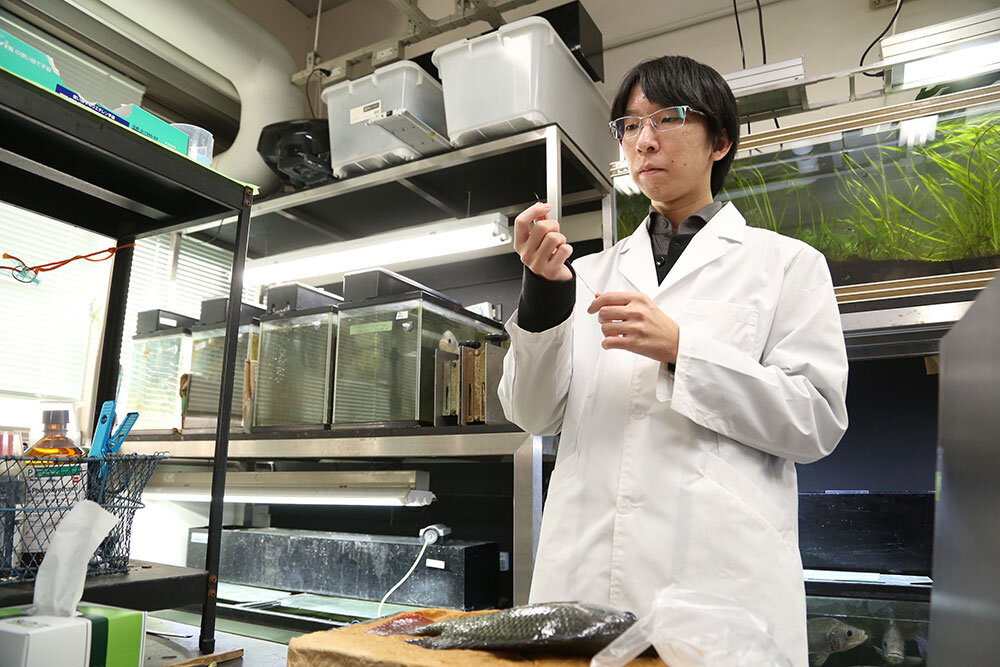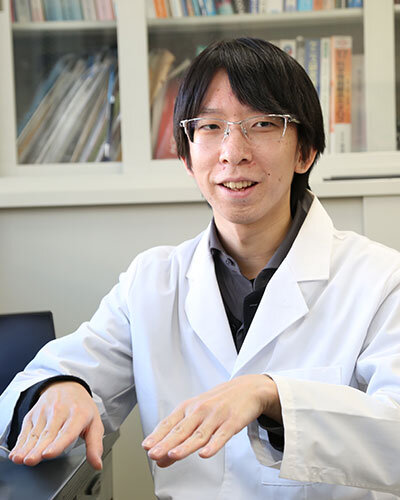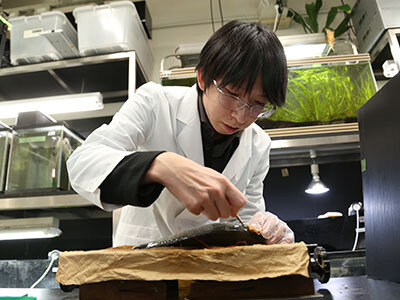INTRODUCTION学生紹介
- HOME
- support
- Student Introduction
- HORIGUCHI YUSUKE
STUDENT INTRODUCTION
Marine Resources and Environment
HORIGUCHI YUSUKE
Specializations:Ocean Sciences
Main academic advisor:WU, Haiyun
Mentor:MIYAMOTO, Ryusuke / SHIODE, Daisuke

I highly recommend the WISE Program to undergraduates who want to study data analysis or AI, but lack the background
Physical condition of fish reveals behavioral principles
My research involves attaching recording devices to fish to measure their blood sugar levels and body movements.
We know that the blood sugar levels of fish increase when they are stressed; my research uses blood sugar level data to focus on how fish respond to stress.
It has always been my dream to understand how creatures are behaving and feeling, something they cannot communicate in words. To gain this understanding, I decided to gather quantitative, evidence-based data on fish, and that is how my research started. The goal of my research is to clarify the principles of fish behavior based on data on their physical condition, which we cannot observe from outside their bodies.
 The subject of my experiments is a species of fish called Nile tilapia. Although not common in Japan, it is one of the most farmed fish in the world. I chose this species because it is farmed in such high quantities and is very hardy. To measure the blood sugar levels of fish, we insert a needle-type sensor into their bodies. Weak fish do not survive this operation if the sensor is not deftly implanted, but since Nile tilapia is so hardy, they can survive for several minutes under anesthesia. Their strength and robustness make them ideal to run experiments on.
The subject of my experiments is a species of fish called Nile tilapia. Although not common in Japan, it is one of the most farmed fish in the world. I chose this species because it is farmed in such high quantities and is very hardy. To measure the blood sugar levels of fish, we insert a needle-type sensor into their bodies. Weak fish do not survive this operation if the sensor is not deftly implanted, but since Nile tilapia is so hardy, they can survive for several minutes under anesthesia. Their strength and robustness make them ideal to run experiments on.
Many studies over the years have dealt with changes in blood sugar levels in fish associated with stressors. I am going a step further by attaching a device that measures acceleration in the bodies of fish, and using this acceleration and video analysis during the experiments to investigate the conditions under which stress builds.
Obtaining positional information of fish in the form of coordinates to objectively determine their physical condition
Stress raises blood sugar levels, but that is true of any type of stress. Levels increase when fish are chased around and when the water quality deteriorates. Until now, data from sensors alone could not tell us exactly why blood sugar levels were rising. If we add acceleration data, we can speculate on the reasons. If the fish were moving around when their blood sugar levels rose, perhaps they were being chased. If they were staying still, maybe the water quality was deteriorating.
Although we watch the fish closely during the experiments, we also record and analyze video and use AI to obtain positional coordinates for each fish to objectively and quantitatively understand their behavior. The reason for this is that if we have positional coordinates, we can use them to determine the condition of the fish, including how their location factors into their condition.
The most appealing aspect of my research is that I can acquire data while the fish are swimming. Although other experiments involve attaching devices to marine creatures to measure the paths they swim, GPS-like positional information, or water temperature, it takes some creativity to obtain physiological data. While this is no simple matter, I find the very task of obtaining physiological data while fish are swimming to be interesting.
Also, the common practice is to catch fish, anesthetize them, and take blood samples to measure their blood sugar levels. Since all of these actions are stressful to the fish, physiological data taken while they are swimming will be closer to the true values. That is another interesting point.
I think my research could be useful in future aquaculture farms, aquariums, and other places where there is a need to raise fish artificially. In these types of places, fish die or fall ill, and only then do operators realize that something is wrong and start searching for solutions. However, the sensors we work with in our laboratory only need to be attached to fish, allowing them to swim around freely. Elevated blood sugar levels are indicative of some type of stress and can be used to search for and address stress factors before they cause problems for the fish.
Gratitude for the easy availability of professors under the WISE Program's mentor system
 I have been doing this research since I was an undergraduate and was able to obtain blood sugar and acceleration data simultaneously. I realized, however, that I did not know how to analyze the data, and it was then that I decided to apply for the WISE Program. Data analysis skills are necessary for me to know how to use data and for my future as a researcher. In the WISE Program, my goal is to study to hone my data analysis skills.
I have been doing this research since I was an undergraduate and was able to obtain blood sugar and acceleration data simultaneously. I realized, however, that I did not know how to analyze the data, and it was then that I decided to apply for the WISE Program. Data analysis skills are necessary for me to know how to use data and for my future as a researcher. In the WISE Program, my goal is to study to hone my data analysis skills.
In the WISE Program, I have studied and applied knowledge in parallel. I entered the program with absolutely no background in machine learning, computer science, or data science. Even in cases like mine, the mentor system brings you into contact with professors in adjacent fields who are available to advise on AI technology. I use the system quite a lot, and frequently turn to the professors for advice. I am very grateful that they are so available for consultation and believe it is a wonderful system for people wishing to do data analysis but lacking the background.
Aiming to continue my research after completing the doctoral program and expanding my reach beyond physiological data
I intend to continue on to the doctoral program from the laboratory I am studying in now, and then to work as a researcher. I enrolled at Tokyo University of Marine Science and Technology and joined this laboratory because I found the opportunity to obtain physiological data most appealing. I will continue to acquire skills related to data analysis and intend to use them to expand my research to include methods for obtaining data on fish and animals beyond physiological data.

